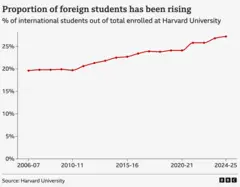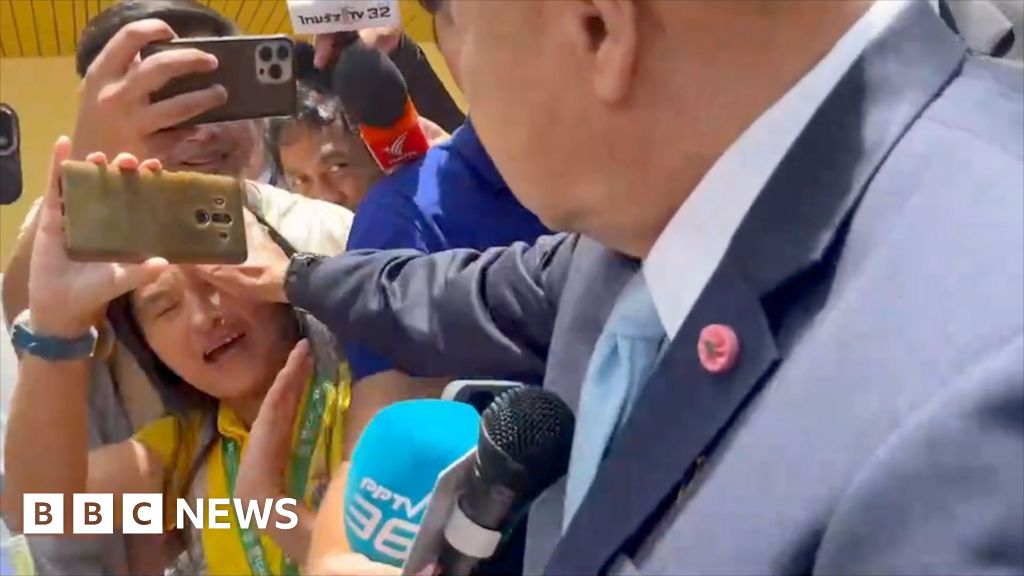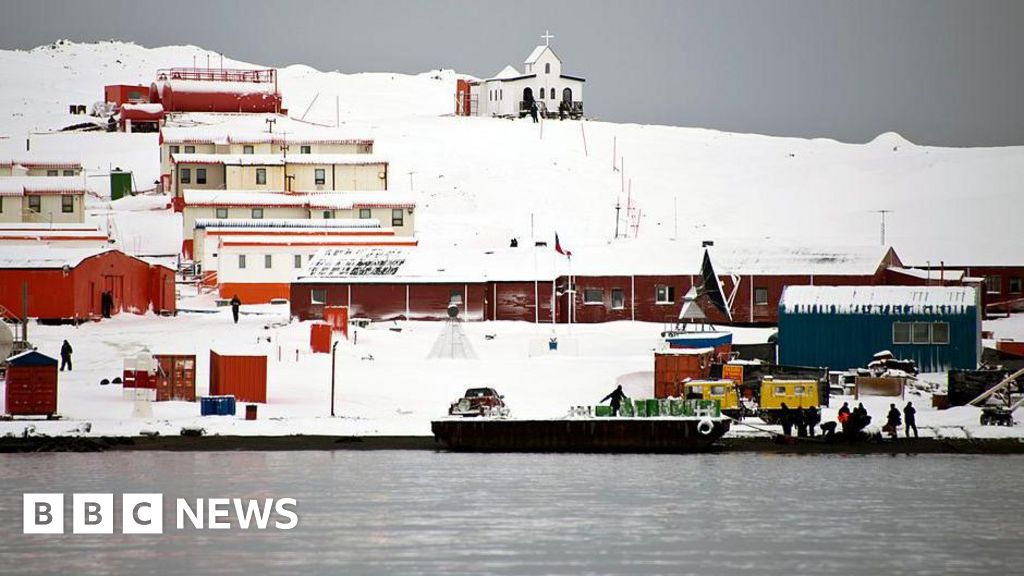from Chicago and Cambridge
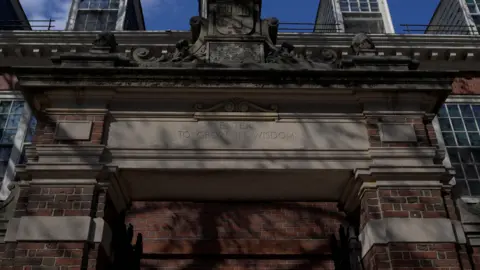 Reuter
ReuterA judge has issued a temporary restraining order blocking the Trump administration’s plan to strip Harvard University of its ability to enrol foreign students.
The ruling came after Harvard filed a lawsuit – the latest escalation of a dispute between the White House and one of America’s most prestigious institutions.
The university said the administration’s decision on Thursday to bar international students was a “blatant violation” of the law and free speech rights.
The Trump administration says Harvard has not done enough to fight antisemitism, and change its hiring and admissions practices – allegations that the university has strongly denied.
US District Judge Allison Burroughs issued a temporary restraining order in a short ruling issued on Friday.
The order pauses a move that the Department of Homeland Security made on Thursday to revoke Harvard’s access to the Student and Exchange Visitor Program (SEVP) – a government database that manages foreign students.
The next hearing will occur on 29 May in Boston.
“With the stroke of a pen, the government has sought to erase a quarter of Harvard’s student body, international students who contribute significantly to the University and its mission,” Harvard argued in the lawsuit.
“We condemn this unlawful and unwarranted action,” Harvard President Alan Garber said in a letter.
“The revocation continues a series of government actions to retaliate against Harvard for our refusal to surrender our academic independence and to submit to the federal government’s illegal assertion of control over our curriculum, our faculty, and our student body,” he wrote.
In response, White House deputy press secretary Abigail Jackson said: “If only Harvard cared this much about ending the scourge of anti-American, anti-Semitic, pro-terrorist agitators on their campus they wouldn’t be in this situation to begin with.
After the restraining order was issued, Ms Jackson accused the judge in the case of having a “liberal agenda”.
“These unelected judges have no right to stop the Trump Administration from exercising their rightful control over immigration policy and national security policy,” she said.
Graduation in the shadow of uncertainty
It was quiet at Harvard on Friday. Classes have finished for the year and preparations are being made for commencements. Gazebos were going up on the quad as students rented their gowns and collected tickets for family members.
For those graduating, it should be a week of celebration. But for foreign students hoping to remain in the US, it’s been a 24-hour whirlwind.
All morning Harvard’s international student body scrambled to find out what was going to happen. Would they have to leave the US immediately? Were they now under the threat of deportation?
Cormac Savage from Downpatrick in Co Down Northern Ireland is six days from graduating with a degree in government and languages. He’s taking a job in Brussels, partly because of the uncertainty in the US.
“You know that you’re fine if you’re still legally in the United States for the next 90 days, but you don’t know that you can come back and finish your degree,” he said on Friday. “You don’t know if you can stay and work in the US if you’re about to graduate.
The order also complicates plans for students still enroled, like Rohan Battula, a junior from the UK who will rely on his visa to work in New York in June.
“I was worried if I went home I wouldn’t get to come back,” he told BBC, so he opted to stay on campus.
For a group of international students gathered on the banks of the Charles River, as rowing teams sculled by, the relief was palpable when news came in of the reprieve from the Boston court.
Mr Battula also felt relieved after Judge Burroughs issued her order. But the uncertainty still is taking a toll.
“It’s surreal to think that even for some period of time you’re unlawfully staying in a country, just because you’ve been to university there,” Mr Battula said.
Student dreams left in limbo
There are around 6,800 international students at Harvard, who make up more than 27% of its enrolled students this year.
Around a fifth of them are from China, with significant numbers from Canada, India, South Korea and the UK. Among the international students currently enrolled is the future queen of Belgium, 23-year-old Princess Elisabeth.
Leo Ackerman was set to study education and entrepreneurship at Harvard beginning in August, fulfilling a “dream”.
“I was really excited, and I’m still really excited if I manage to go there,” Mr Ackerman said. “Having it taken away feels like a really sad moment for a lot of people.”
Eliminating foreign students would take a large bite out of Harvard’s finances. Experts say international students are more likely to pay full tuition, essentially subsidising aid for American students.
Undergraduate tuition – not including fees, housing, books, food or health insurance – will reach $59,320 (£43,850) in the coming academic year, according to the university. The total cost of a year at Harvard before any financial aid is usually significantly more than $100,000.
Isaac Bangura, a public administration student from Sierra Leone, moved to Harvard with his wife and two young daughters after surviving a civil war.
“Since yesterday, my kids has been asking, ‘Daddy, I understand they are coming to return us home again.’ They are referring to deportation,” he said.
He said he has to be strong for them and has faith. “I know the American people are always, whenever they are into issues, they will find ways of resolving it,” he said.
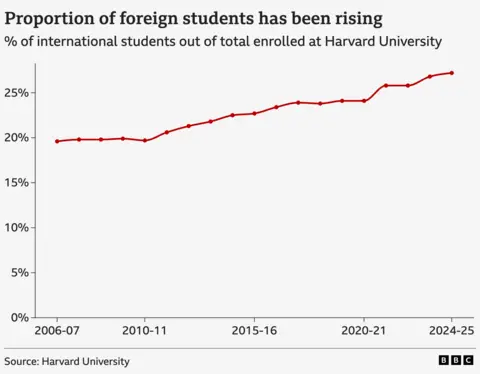
The government vs. an ultra-elite university
In addition to Harvard, the Trump administration has taken aim at other elite institutions, not only arguing that they should do more to clamp down on pro-Palestinian activists but also claiming they discriminate against conservative viewpoints.
On Friday, speaking from the Oval Office, President Donald Trump said, “Harvard is going to have to change its ways” and suggested he is considering measures against more universities.
In April, the White House froze $2.2bn (£1.7bn) in federal funding to Harvard, and Trump has threatened to remove the university’s tax-exempt status, a standard designation for US educational institutions.
The funding freeze prompted an earlier Harvard lawsuit, also asking the courts to stop the administration’s actions.
Carl Tobias, a University of Richmond law professor, said federal courts in Massachusetts and New England, where the initial stages of the case will play out, have consistently ruled against the Trump administration.
But the outcome may be less predictable in the US Supreme Court, where Harvard’s case may end up.
“These are tough issues for Harvard, but they have the resources and they seem to have the will to fight,” Mr Tobias said.
Harvard leaders have made concessions to the White House – including dismissing the leaders of its Center for Middle Eastern Studies, who came under fire for failing to represent Israeli perspectives.
But it also enlisted several high-profile Republican lawyers, including Robert Hur, a former special counsel who investigated Joe Biden’s retention of classified documents.
Foreign students currently attending Harvard have expressed worries that the row could force them to transfer to another university or return home. Being logged on the SEVP system is a requirement for student visas and, if Harvard is blocked from the database, students could be found in violation and potentially face deportation.
Several British students enrolled at Harvard, who spoke to the BBC on condition of anonymity out of fear of immigration authorities, worried their US education could be cut short.
“I definitely think freedom of speech is a problem on campus, but it’s being actively worked on… it was an absolute shock when yesterday’s announcement happened,” said one student
“There’s a lot of anger, people feeling like we’re being used as pawns in a game.”
With reporting from Kayla Epstein in New York, Bernd Debusmann at the White House and the BBC’s User Generated Content team

